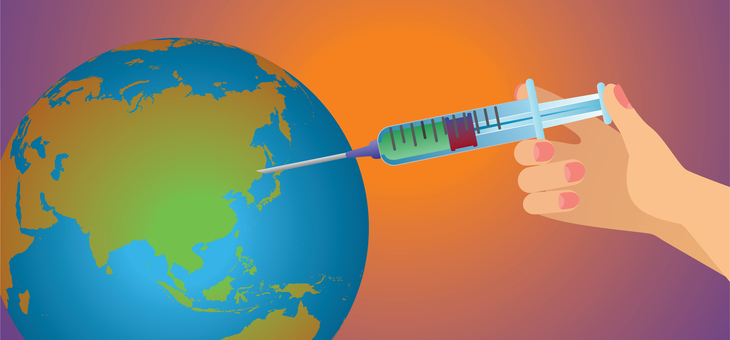Recent COVID-19 vaccine announcements have been hailed as “game-changers” and the “start of the end of the pandemic”. In particular, the prospective Pfizer/BioNTech vaccine, which could offer 90 per cent effectiveness against symptoms, is offering hope.
It’s remarkable how quickly scientists have produced vaccine candidates. But with rapidly developed technologies, the challenges don’t end with finding a working vaccine. When inoculating an entire planet, logistics present massive challenges.
Firstly, who gets jabbed first?
In Australia, the federal government has secured 10 million doses of the Pfizer vaccine, which it hopes to roll out as early as March. Our population is more than 25 million.
NSW Premier Gladys Berejiklian said health workers and vulnerable people including the elderly would be vaccinated first.
“We’re actually drawing up a plan now in NSW to ensure those most vulnerable and, of course, our health workers and those dealing directly with COVID patients manage to have that vaccine,” Ms Berejiklian told The New Daily.
Australia’s national cabinet has ratified a national immunisation policy “to monitor immunisation levels and individual vaccination status”.
It has confirmed that a successful vaccine will first be handed out to “those at increased risk of exposure, including health and aged care workers, those working in critical jobs and those at an increased risk of getting COVID-19”.
COVID-19 vaccines will be available free to all Australian citizens, permanent residents, and most visa holders.
The state and territory governments will govern how a successful vaccine is delivered to people at vaccination sites.
The Australian Immunisation Register will keep track of Australia’s immunisation levels and the federal government’s digital health database My Health Record should play a key role in recording vaccinations.
However, researchers at Macquarie University, QUT and the CSIRO have analysed the movements of people in Chinese cities Beijing and Shanghai to build a model that provides the vaccine to people “who are most likely to become super-spreaders”.
If that model was adopted, authorities would focus on locations where a potential super-spreader visits and vaccinate all direct and indirect contacts there.
While celebrating the rapid development of vaccines, The Economist says we don’t yet know enough about how they work: It’s not clear “whether the (Pfizer) vaccine stops severe cases or mild ones, or whether it protects the elderly, whose immune systems are weaker. Nor is it known whether inoculated people can still cause potentially fatal infections in those yet to receive jabs. And it is too soon to be sure how long the beneficial effects will last.”
The other challenges, once vaccines become available, are in logistics and distribution.
The Pfizer vaccine will remain in short supply throughout 2021.
“Nobody has ever tried to vaccinate an entire planet at once. As the effort mounts, syringes, medical glass and staff could run short.”
And the vaccine “comes in batches of at least 975 doses, so you need to assemble that many people for their first shot, and the same crowd again 21 days later for a booster. Nobody knows how many doses will be wasted.”
With not enough of the vaccine to go around until 2022, governments must get their priorities right.
“Modelling suggests that if 50 rich countries were to administer two billion doses of a vaccine that is 80 per cent effective, they would prevent a third of deaths globally; if the vaccine were supplied according to rich and poor countries’ population, that share would almost double.”
All vaccines must be kept refrigerated as they are transported through a ‘cold chain’, moving from manufacturer to port, then to other countries and to clinics. But Pfizer’s shots need to be stored at -70 degrees Celsius and the ‘ultra-cold chains’ required to distribute the Pfizer vaccine may be too costly for some Asian and African countries, where the climate is warm, distances vast and necessary infrastructure can be lacking.
The global solution to some of these issues is hopefully COVAX, an international initiative to encourage equal access to supplies. More than 150 countries, representing 64 per cent of the world’s population, are signed up to the scheme, which aims to provide two billion doses by the end of 2021. The idea is that rich and poor countries pool their money to ensure lower-income countries fair access to future vaccines.
By having a range of vaccine trials signed up, it is expected at least one will be successful.
Australia has spent $123 million with COVAX, which gives it access to doses for up to half the population.
It is anticipated that the successful vaccine will require two or more doses, so Australia is also negotiating deals with individual manufacturers such as Melbourne-based vaccine manufacturer CSL to help it make a vaccine locally. CSL could use cold chain transportation it currently uses for its influenza vaccine to transport the COVID vaccine across Australia.
The Economist, while excited by Pfizer’s advances, says the solution to all the challenges facing global inoculation is “continued work on more vaccines”.
“Some might survive in commercial refrigerators, others will work better on the elderly, still others might confer longer protection, require a single shot, or stop infections as well as symptoms. All those that work will help increase supply.”
Well, those are the main challenges. After we get everyone access to a vaccine, the final challenge will be those who don’t want it.
“Only when there is enough to go around will anti-vaxxers become an obstacle. Early reports suggest the jab causes fevers and aches, which may also put some people off.
“The good news is that an efficacy of 90 per cent makes vaccination more attractive.”
When do you think you will get inoculated against COVID-19?
Should Australia remain closed to international visitors until most of the population is vaccinated?
If you enjoy our content, don’t keep it to yourself. Share our free eNews with your friends and encourage them to sign up.
Related articles:
https://www.yourlifechoices.com.au/health/covid19/dont-get-excited-about-new-vaccine
https://www.yourlifechoices.com.au/health/covid19/government-support-extended
https://www.yourlifechoices.com.au/health/covid19/travel-tech-to-invade-privacy

